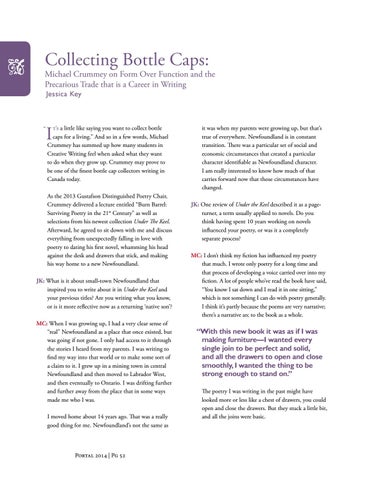•
Collecting Bottle Caps:
Michael Crummey on Form Over Function and the Precarious Trade that is a Career in Writing Jessica Key
“
I
t’s a little like saying you want to collect bottle caps for a living.” And so in a few words, Michael Crummey has summed up how many students in Creative Writing feel when asked what they want to do when they grow up. Crummey may prove to be one of the finest bottle cap collectors writing in Canada today. As the 2013 Gustafson Distinguished Poetry Chair, Crummey delivered a lecture entitled “Burn Barrel: Surviving Poetry in the 21st Century” as well as selections from his newest collection Under The Keel. Afterward, he agreed to sit down with me and discuss everything from unexpectedly falling in love with poetry to dating his first novel, whamming his head against the desk and drawers that stick, and making his way home to a new Newfoundland.
JK: What is it about small-town Newfoundland that inspired you to write about it in Under the Keel and your previous titles? Are you writing what you know, or is it more reflective now as a returning ‘native son’? MC: When I was growing up, I had a very clear sense of “real” Newfoundland as a place that once existed, but was going if not gone. I only had access to it through the stories I heard from my parents. I was writing to find my way into that world or to make some sort of a claim to it. I grew up in a mining town in central Newfoundland and then moved to Labrador West, and then eventually to Ontario. I was drifting further and further away from the place that in some ways made me who I was. I moved home about 14 years ago. That was a really good thing for me. Newfoundland’s not the same as
Portal 2014 | Pg 52
it was when my parents were growing up, but that’s true of everywhere. Newfoundland is in constant transition. There was a particular set of social and economic circumstances that created a particular character identifiable as Newfoundland character. I am really interested to know how much of that carries forward now that those circumstances have changed. JK: One review of Under the Keel described it as a pageturner, a term usually applied to novels. Do you think having spent 10 years working on novels influenced your poetry, or was it a completely separate process? MC: I don’t think my fiction has influenced my poetry that much. I wrote only poetry for a long time and that process of developing a voice carried over into my fiction. A lot of people who’ve read the book have said, “You know I sat down and I read it in one sitting,” which is not something I can do with poetry generally. I think it’s partly because the poems are very narrative; there’s a narrative arc to the book as a whole.
“With this new book it was as if I was making furniture—I wanted every single join to be perfect and solid, and all the drawers to open and close smoothly, I wanted the thing to be strong enough to stand on.” The poetry I was writing in the past might have looked more or less like a chest of drawers, you could open and close the drawers. But they stuck a little bit, and all the joins were basic.
